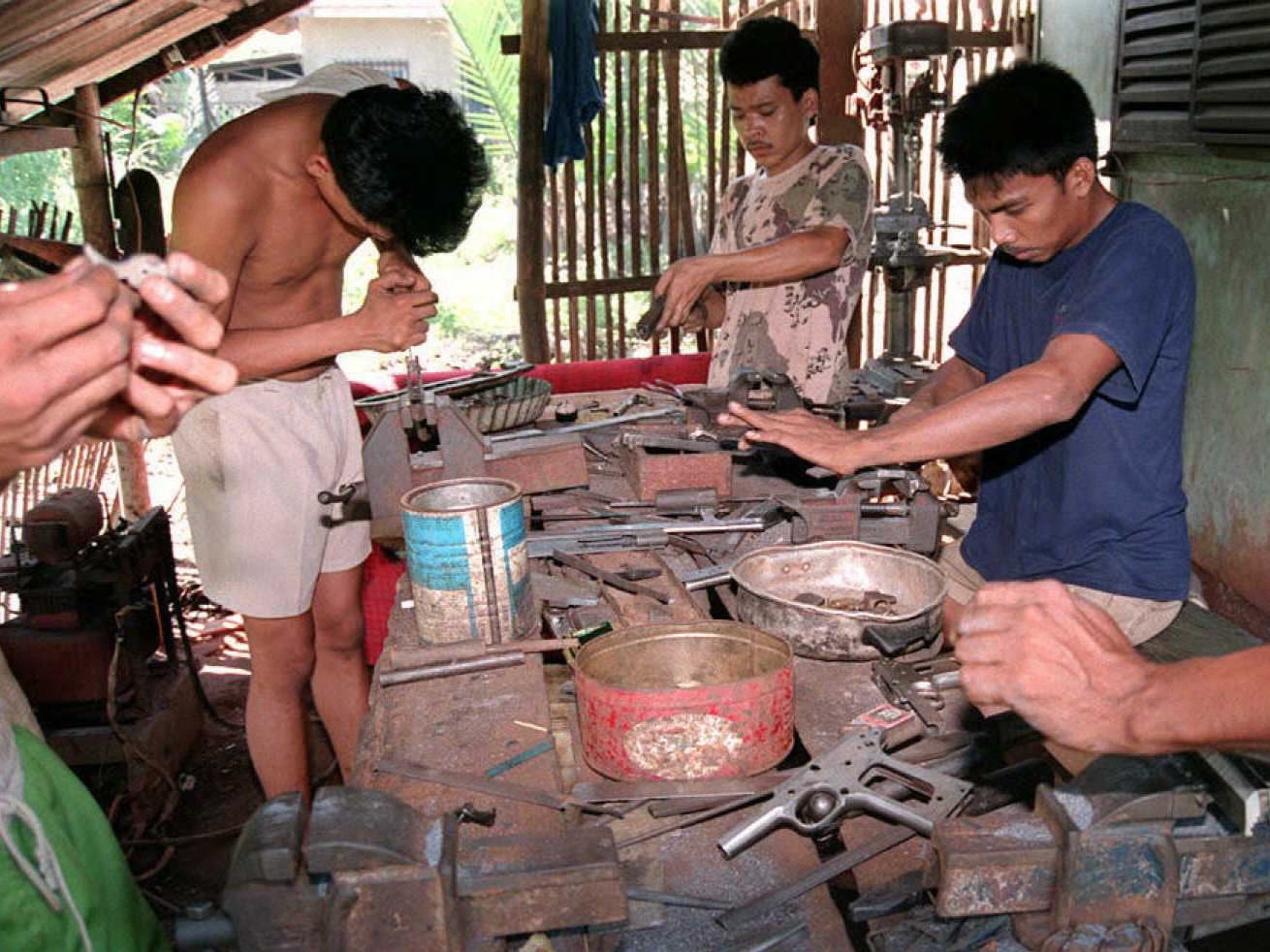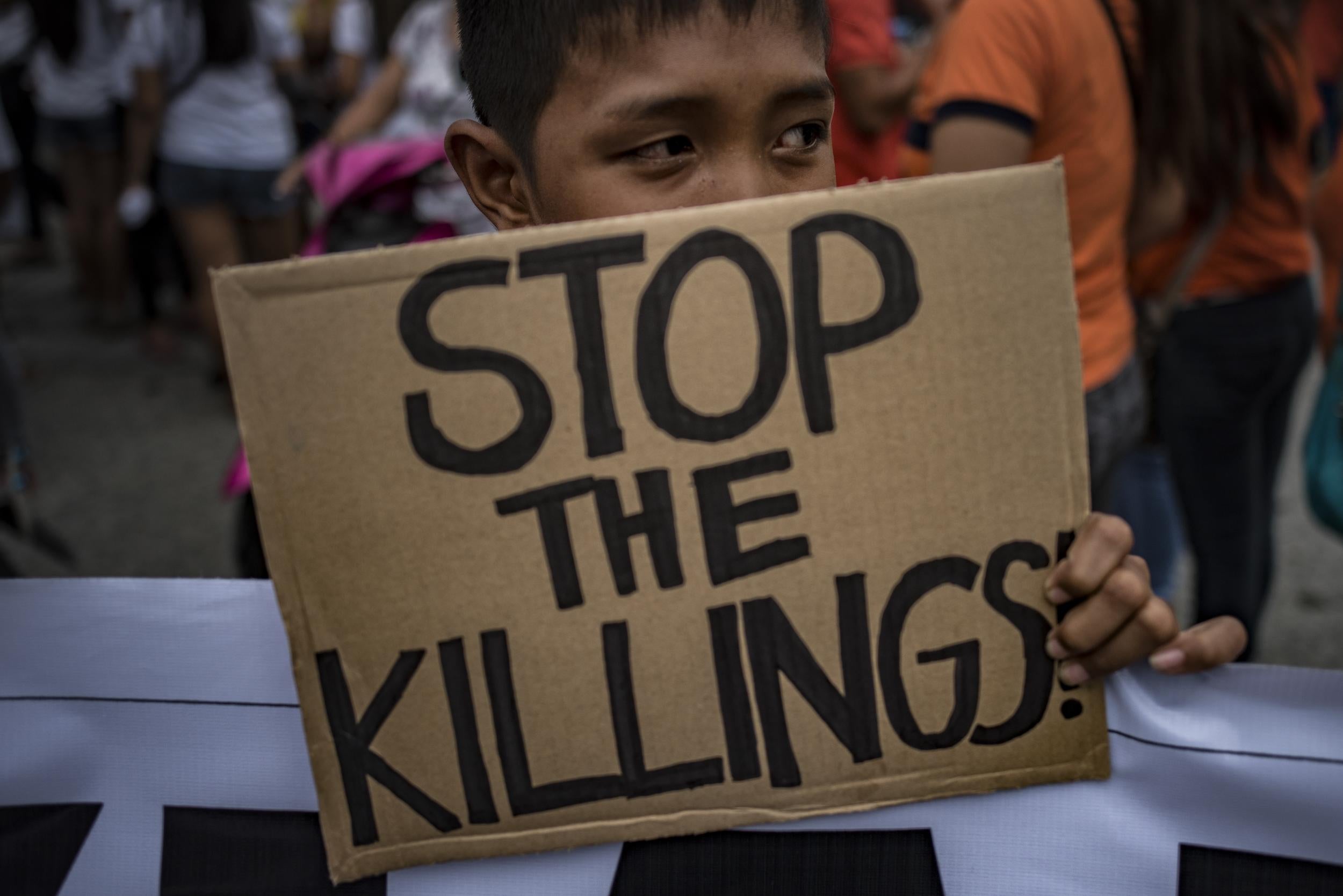For some Filipinos, the family business is illegal, dangerous and deadly
The gun-making trade is able to flourish in a remote place where jobs are scarce, police presence is thin and lawlessness runs deep, writes Jason Gutierrez

Your support helps us to tell the story
From reproductive rights to climate change to Big Tech, The Independent is on the ground when the story is developing. Whether it's investigating the financials of Elon Musk's pro-Trump PAC or producing our latest documentary, 'The A Word', which shines a light on the American women fighting for reproductive rights, we know how important it is to parse out the facts from the messaging.
At such a critical moment in US history, we need reporters on the ground. Your donation allows us to keep sending journalists to speak to both sides of the story.
The Independent is trusted by Americans across the entire political spectrum. And unlike many other quality news outlets, we choose not to lock Americans out of our reporting and analysis with paywalls. We believe quality journalism should be available to everyone, paid for by those who can afford it.
Your support makes all the difference.In the remote, mist-covered slopes outside the city of Danao in the central Philippines sits the illegal, makeshift workshop of a master gunmaker. Accessible only by foot on a steep, winding pathway camouflaged by thick vegetation, the ramshackle shop owned by I Launa has a tattered tarpaulin roof, a work table and several machines for cutting and shaping steel. The whole operation can be packed up and moved on short notice.
Illegal gunmaking is a livelihood that has helped put food on the table and send the family’s children to school since the 1970s, and Launa, who asks that only the initial of his first name be used for fear of being arrested, is just one of a host of such small-scale gunsmiths in the region. His village alone is home to about a dozen.
The trade – which contributes to the estimated two million unregistered guns in the Philippines; slightly more than the 1.7 million legally registered weapons – is able to flourish in a remote place where jobs are scarce, police presence is thin and lawlessness runs deep.
Gunmaking “is an essential craft passed on from one generation to another here”, says Launa, 63, who learned the craft from his father and has taught it to his son. “Many presidents have come and gone,” he adds, as a single fluorescent light illuminates the table in front of him, where several unfinished Colt .45 pistol replicas lie. “But we are still here.”
Gunsmithing blossomed in the area during the Second World War, as locals were taught to make weapons to support a guerrilla movement fighting the Japanese. By the 1960s, Danao had become the go-to place for outlaws and ordinary citizens wanting cheap but high-quality replicas. Once these gunmakers would sell their products out in the open, but now they employ runners to surreptitiously deliver their wares. Sometimes, a broker stops by to commission a gun for a client.
In the 1990s an effort was made to legalise the trade by regulating gunmakers, but the project failed to win government support. The handguns – which even an enthusiast would have a hard time determining are illegal copies, down to the “Colt Automatic Caliber .45 Government Model” engraving – are sold to buyers for around 7,000 pesos, about £280, which is much cheaper than authentic models.
Other weapons, like submachine guns, can be commissioned too, although orders for the higher caliber weapons have become slow amid the government crackdown. The craft practised here is taking a deadly toll across the country.
Police say hitmen working for rival politicians have been known to source their weapons from the Danao area, and that sales have picked up slightly as the country prepares for elections in May. Several politicians have been killed in election-related violence.
Danao-made guns, according to police, have been found at the site of extrajudicial killings, which have been attributed to pro-government militias carrying out orders by president Rodrigo Duterte to stamp out drug crimes. Police say the guns have also made their way into the hands of Abu Sayyaf, a small but violent terrorist group in the south that is increasingly allying itself with Isis.
“Right now, anyone can buy a gun here, as long as you have the money to pay, even if you were a thief, a killer or a gun for hire,” says the local police chief, Jaime Quiocho, who notes the appeal of such illicit purchases to criminals. “Will you buy a gun that is licensed and can be traced back to you?”

Bordered by rugged mountain ranges, Danao lies 20 miles from Cebu, the bustling main city in central Philippines. An electronics factory provides jobs to a portion of the population of 130,000, which is mostly Catholic and poor, although farming and fishing are the main industries.
At Launa’s workshop, which on any given day might be working on four gun orders, metal cuts of gun parts are scattered on the table. His 28-year-old son is fine-tuning a barrel and a trigger mechanism for a pistol. He chisels and hammers every inch of the weapon, before assembling it and repeatedly checking its mechanism. As a final test, he fires into a hole in the ground.
Asked whether he ever feels guilty knowing his guns might have been used in summary killings, Launa says: “I make guns but I don’t tell people to kill others.”
I make guns but I don’t tell people to kill others
The popularity of guns has, in a way, made the local industry a victim of its own success. The more the guns have become known, the more they have attracted the eyes of organised groups of thieves and of the police who want to shut the workshops down. “We have to hide because one has to be careful nowadays,” Launa says.
Police chief Quiocho acknowledges the gunmakers have little incentive or opportunity to abandon a trade that has provided a livelihood for generations. “It has been a way of life for many,” he says. “If they stop it, what will happen to them?” He says pursuing illegal gunmakers is only a stopgap measure that can not fully solve a problem also rooted in poverty. That isn’t to say he has given up trying.
Police conducted about 70 raids last year that led to the seizure of about 92 firearms, Quiocho says. Charges were filed against around 80 people, though some were released on bail. Tracking down the gunmakers has not been easy. Many of them have spies who inform them of impending raids, giving them time to move to another location. Others have migrated elsewhere. The police chief suggests legalising the industry so Danao guns can be properly tracked.
“They will make guns whether we like it or not,” he says. “So why not control the industry, their quality and where they go?”
Impressed by the quality of the confiscated guns he comes across in the course of raids, Quiocho says Danao gunmakers could compete with other manufacturers in the region if given the support.
“Gunsmiths here can make replicas just by looking at the pictures,” he says. “That is a testament to their advanced skills. They can compete with high-end makers.”
Francisco Lara Jr of International Alert Philippines, a conflict monitoring group, agrees that Danao guns should be legalised, to “stem the product and flow of illicit weapons into the market”.
The city government has tried to offer alternative livelihoods, though it has been a tough sell in a place where gunmaking is ingrained in the fabric of society.
Launa’s son initially set out on a different path. After finishing school, he hoped to support himself with a job in the city so he could save up to study to become an engineer. But his menial jobs paid just enough to eat, and eventually he decided to return home. “So here I am,” he says. “I make guns for a living. It is an honest job.”
© New York Times
Join our commenting forum
Join thought-provoking conversations, follow other Independent readers and see their replies
Comments